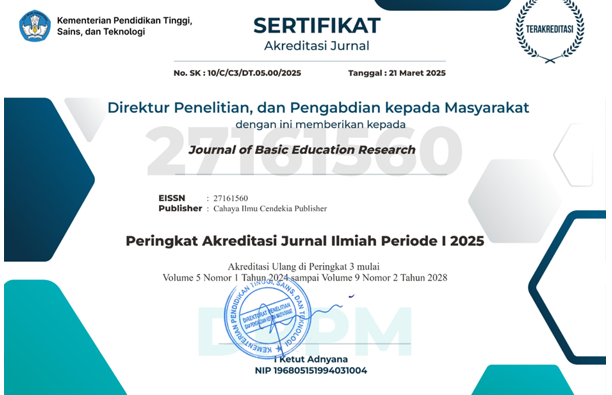Penerapan Model Pembelajaran Inside-Outside Circle (Ioc) untuk Meningkatkan Kemampuan Pemecahan Masalah Siswa
Abstract
Tujuan Penelitian: Penelitian ini dilatar belakangi oleh rendahnya kemampuan pemecahan masalah siswa dalam pembelajaran geometri di kelas IV C SD Negeri No. 13/I Muara Bulian. Siswa kesulitan dalam menyelesaikan persoalan terkait pemecahan masalah. Tujuan penelitian ini adalah untuk mengetahui penerapan model pembelajaran IOC (Inside Outside Circle) dalam meningkatkan kemampuan pemecahan masalah siswa pada pembelajaran geometri di kelas IV Sekolah Dasar.
Metodologi: Jenis penelitian ini adalah Penelitian Tindakan Kelas. Pengumpulan data pada penelitian ini menggunakan observasi, tes, wawancara, dan dokumentasi. Subjek penelitian ini adalah siswa kelas IV C SDN No. 13/I Muara Bulian yang berjumlah 27 siswa
Temuan Utama: Hasil penelitian menunjukkan bahwa penerapan model pembelajaran IOC (Inside Outside Circle) dapat meningkatkan kemampuan pemecahan masalah siswa dalam pembelajaran geometri dengan menerapkan langkah-langkah model pembelajaran. Dari hasil yang diperoleh dapat disimpulkan bahwa model pembelajaran IOC (Inside Outside Circle) memiliki peran dalam meningkatkan kemampuan pemecahan masalah siswa dalam pembelajaran geometri di kelas IV C SD Negeri No. 13/I Muara Bulian
References
Yudefrizal, “Dampak Sistem Full Day School Terhadap Prestasi Belajar,” Jurnal Pendidikan, vol. 1, no. 1, 2017.
Baharudin, Pendidikan dan Psikologi Perkembangan. Yogyakarta: Ar-Ruzz Media, 2010.
S. Suranto, and Suharningsih, “Pengaruh Sistem Full Day School Terhadap Hasil Belajar Siswa,” Jurnal Pendidikan, vol. 3, no. 5, 2017.
A. G. Wicaksono, “Fenomena Full Day School Dalam Sistem Pendidikan di Indonesia,” Jurnal Pendidikan, vol. 1, no. 1, 2017.
D. A. Kurniawan, A. Astalini, D. Darmaji, and R. Melsayanti, "Students’ attitude towards natural sciences," Int. J. Eval. & Res. Educ, vol 8, no. 3, pp. 455-460, 2019.
J. M. Asmani, Full Day School Konsep Manajemen & Quality Control, Yogyakarta: Ar-ruzz Media, 2017.
A. Astalini, D. Darmaji, D. A. Kurniawan, S. Sumaryanti, R. Perdana, and S. Susbiyanto, "Description Of Relationship Between Students Interests And Attitudes In Physical Subject In Indonesia," Journal of Educational Science and Technology (EST), vol. 5, no. 3, 2019.
Ragella, “Pengelolaan Pembelajaran Full Day School Di Sekolah Dasar,” Jurnal Pendidikan, vol. 3, no. 1, 2011.
C. Wijaya, Dasar-Dasar Manajemen. Medan: Perdana Publishing, 2016.
X. F. Triapriyanto, “Penerapan Sistem Full Day School,” Jurnal Pendidikan, vol. 3, no. 2, 2018.
Y. L. Siregar, “Full Day School Sebagai Penguatan Pendidikan Karakter,” Jurnal Pendidikan dan Manajemen Islam, vol. 2, no. 5, 2017.
A. Dyah, “Pelaksanaan Pembelajaran dan Hasil Belajar Siswa Dalam Pembelajaran,” Jurnal Pendidikan, vol. 2, no. 3, 2012.
N. Sudjana, Dasar-Dasar Proses Belajar Mengajar, Bandung: Sinar Baru Argensindo, 2010.
A. Astalini, D. Darmaji, W. Kurniawan, K. Anwar, and D. A. Kurniawan, "Effectivenes of Using E-Module and E-Assessment," International Journal of Interactive Mobile Technologies (iJIM), vol. 13, no. 9, pp. 21-39, 2019.
S. Arikunto, Prosedur Penelitian: Suatu Pendekatan Praktik. Jakarta: Rineka Cipta, 2013.
Y. D. Setianingtyas, Implementasi Program Full Day School di Sekolah Dasar Islam Terpadu (SDIT) Bakti Insani Sleman Yogyakarta. Yogyakarta: Universitas Negeri Yogyakarta, 2015.
D. Darmaji, D. A. Kurniawan, A. Astalini, A. Lumbantoruan, and S. C. Samosir, "Mobile Learning in Higher Education for The Industrial Revolution 4.0: Perception and Response of Physics Practicum," International Journal of Interactive Mobile Technologies (iJIM), vol. 13, no. 9, pp. 4-20, 2019.
D. Darmaji, A. Astalini, D. A. Kurniawan, and R. Perdana, "A study relationship attitude toward physics, motivation, and character discipline students senior high school, in Indonesia," International Journal of Learning and Teaching, vol. 11, no. 3, pp. 99-109, 2019.
A. Asrial, S. Syahrial, D. A. Kurniawan, F. Chan, P. Nugroho, R. A. Pratama, and R. Septiasari, “Identification: The Effect Of Mathematical Competence On Pedagogic Competency Of Prospective Teacher,” Humanities & Social Sciences Reviews (HSSR), vol. 7, no. 4, pp. 85–92, 2019.
Syahrial, et al. “Increased Behavior of Students’ Attitudes to Cultural Values Using the Inquiry Learning Model Assisted by Ethnocontructivism,” Journal of Educational Science and Technology, vol. 5 no. 2, pp. 176-188, 2019.
Asrial, Syahrial, D. A. Kurniawan, N. Amalina, and M. Subandiyo. “Description of Elementary Teacher Education Program’s Student: Mapping Indonesian Language Competence for Prospective Teacher,” The Educational Reviews, vol. 3 no. 2, pp. 21-27, 2019.
Syahrial, Asrial, D. A. Kurniawan, R. A. Pratama, and R. Perdana. “Towards Improving The Critical Thinking Skills of Pre-service Teachers in Indonesia,” Journal of Education and Learning (EduLearn), vol. 13 no. 4, pp. 575-582, 2018.
Madjid. “Full Day School Policy For Childrend’s Character Development: Lessons From Indonesia Islamic Education,” The Online Journal Of New Horizon In Education, vol. 3, no. 8, pp. 51-60, 2018.
A. Asrial, S. Syahrial, D. A. Kurniawan, and N. Amalina, “Analisis Hubungan Kompetensi Bahasa Indonesia Terhadap Kompetensi Pedagogik Mahasiswa Pendidikan Guru Sekolah Dasar,” Premiere Educandum: Jurnal Pendidikan Dasar dan Pembelajaran, vol. 9, no. 1, pp. 1–8, 2019.
D. Darmaji, D. A. Kurniawan, W. Kurniawan, A. Astalini, K. Anwar, and A. Lumbantoruan, "Students’ perceptions of electronic’s module in physics practicum," Journal of Education and Learning (EduLearn), vol. 13, no. 2, pp. 288-294, 2019.
D. Darmaji, A. Astalini, D. A. Kurniawan, H. Parasdila, I. Irdianti, S. Susbiyanto, K. Kuswanto, and M. Ikhlas. "E-Module Based Problem Solving in Basic Physics Practicum for Science Process Skills," International Journal of Online and Biomedical Engineering (iJOE), vol. 15, no. 15, pp. 4-17, 2019.
S. Ningsih, and Sugiaryo. “Correlation Between The Implementation Full Day School Toward Forming Character At The Xi Grade Students Of Man 1 Surakarta In The Academic Year Of 2016/2017,” Jurnal Global Citizen, vol. 2, no. 2, pp. 53-64, 2016.
M. Danil, “Implementasi Full Day School Di Sekolah Dasar Sabbihisma Padang,” Jurnal Komunikasi Pendidikan, vol. 1, no. 2, 2018.
Yusuf, “Full Day School Excellence Model Implementation Process Fos A Good Education,” Proceedings Ictess Unisri, vol. 1, no. 1, 2017.
A. Hawi, “Sistem Full-Day School Di Sekolah Dasar Islam Terpadu (Sdit),” Jurnal Istinbath, vol. 16, no. 1,. 2015.
M. Hidayanti, “Implementing Full Day School In Indonesia: Analyzing Impacts On Student, Teacher, And Scholl Stakeholders,” Proceedings Of Edvance 2017-3rd International Conference On Advances In Education And Social Science, 2017.
A. Astalini, D. Darmaji, D. A. Kurniawan, and A. Destianti, “Description of the Dimensions Attitudes towards Science in Junior High School at Muaro Jambi,” International Journal of Sciences: Basic and Applied Research (IJSBAR), vol. 47, no. 1, pp. 1–11, 2019.
Z. Rahem, “ Dampak Sosial Pemberlakuan Full Day School,” Jurnal Pendidikan Agama Islam, vol. 1, no. 3, 2017.
E. Wulandari, M. Taufik, and Kuncahyono, “Analisis Implementasi Full Day School Sebagai Upaya Pembentukan Karakter Siswa Di Sd Muhammadiyah 4 Kota Malang,” Jurnal Pemikiran dan Pengembangan SD, vol. 1, no. 6, pp. 65-74, 2018.
M. Kristiawan, and Tobari, “The Characteristics Of The Full Day School Based Elementary School,” Transylvanian Review, vol. 14, no. 25, pp. 3727-3737, 2017.
M. Maison, D. Darmaji, A. Astalini, D. A. Kurniawan, and P. Indrawati, “Science process skills and motivation,” Humanities & Social Sciences Reviews (HSSR), vol. 7, no. 5, pp. 48–56, 2019.
D. Darmaji, D. A. Kurniawan, A. Astalini, and N. R. Nasih, “Persepsi Mahasiswa pada Penuntun Praktikum Fisika Dasar II Berbasis Mobile Learning,” Jurnal Pendidikan: Teori, Penelitian, dan Pengembangan, vol. 4, no. 4, pp. 516–523, 2019.
Copyright (c) 2020 Rusliani Rusliani

This work is licensed under a Creative Commons Attribution-NonCommercial 4.0 International License.
Authors who publish with this journal agree to the following terms:
- Authors retain copyright and acknowledge that the Journal of Basic Education Research is the first publisher licensed under a Creative Commons Attribution 4.0 International License.
- Authors are able to enter into separate, additional contractual arrangements for the non-exclusive distribution of the journal's published version of the work (e.g., post it to an institutional repository or publish it in a book), with an acknowledgment of its initial publication in this journal.
- Authors are permitted and encouraged to post their work online (e.g., in institutional repositories or on their website) prior to and during the submission process, as it can lead to productive exchanges and earlier and greater citation of published work.





.png)


.png)
.png)


















